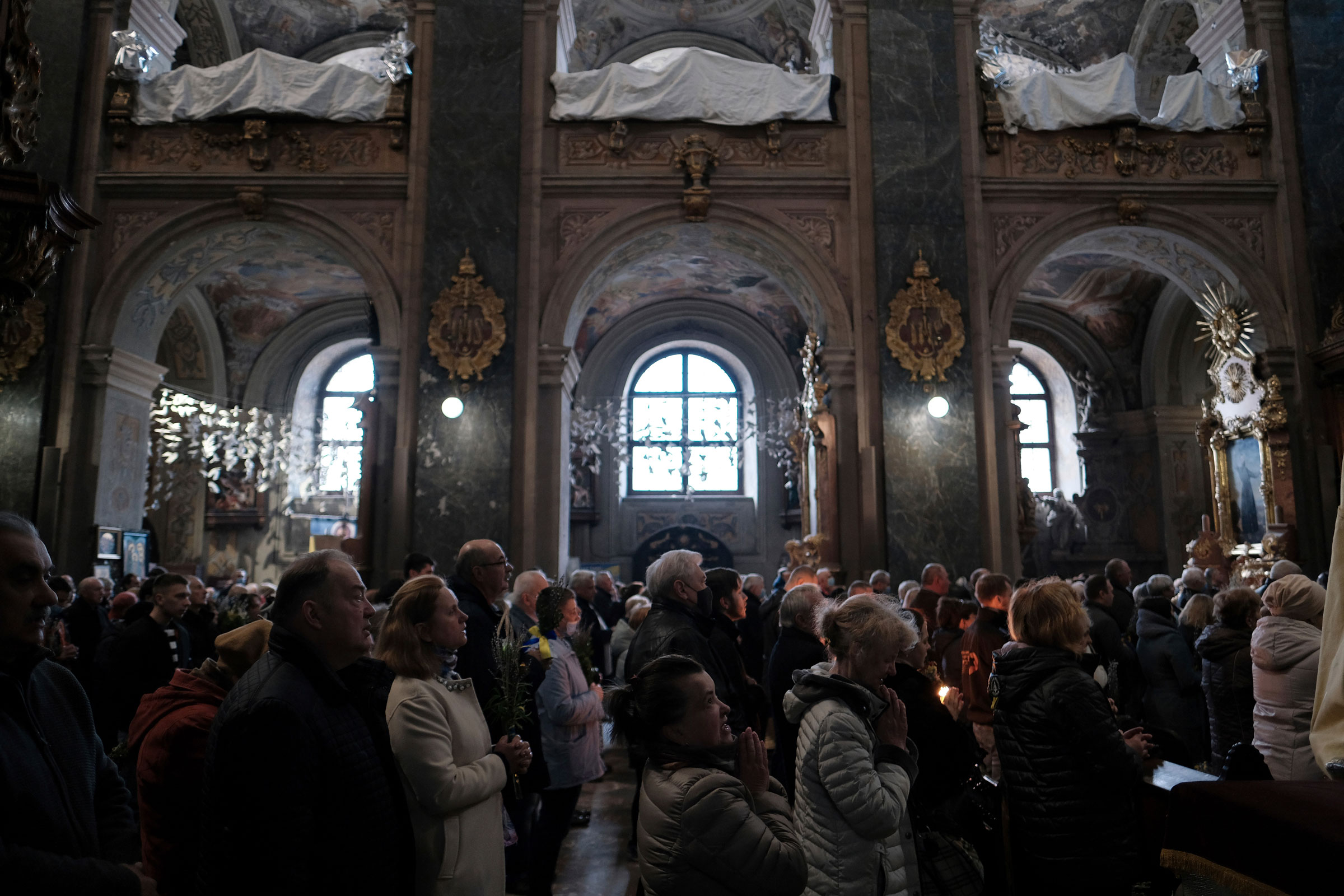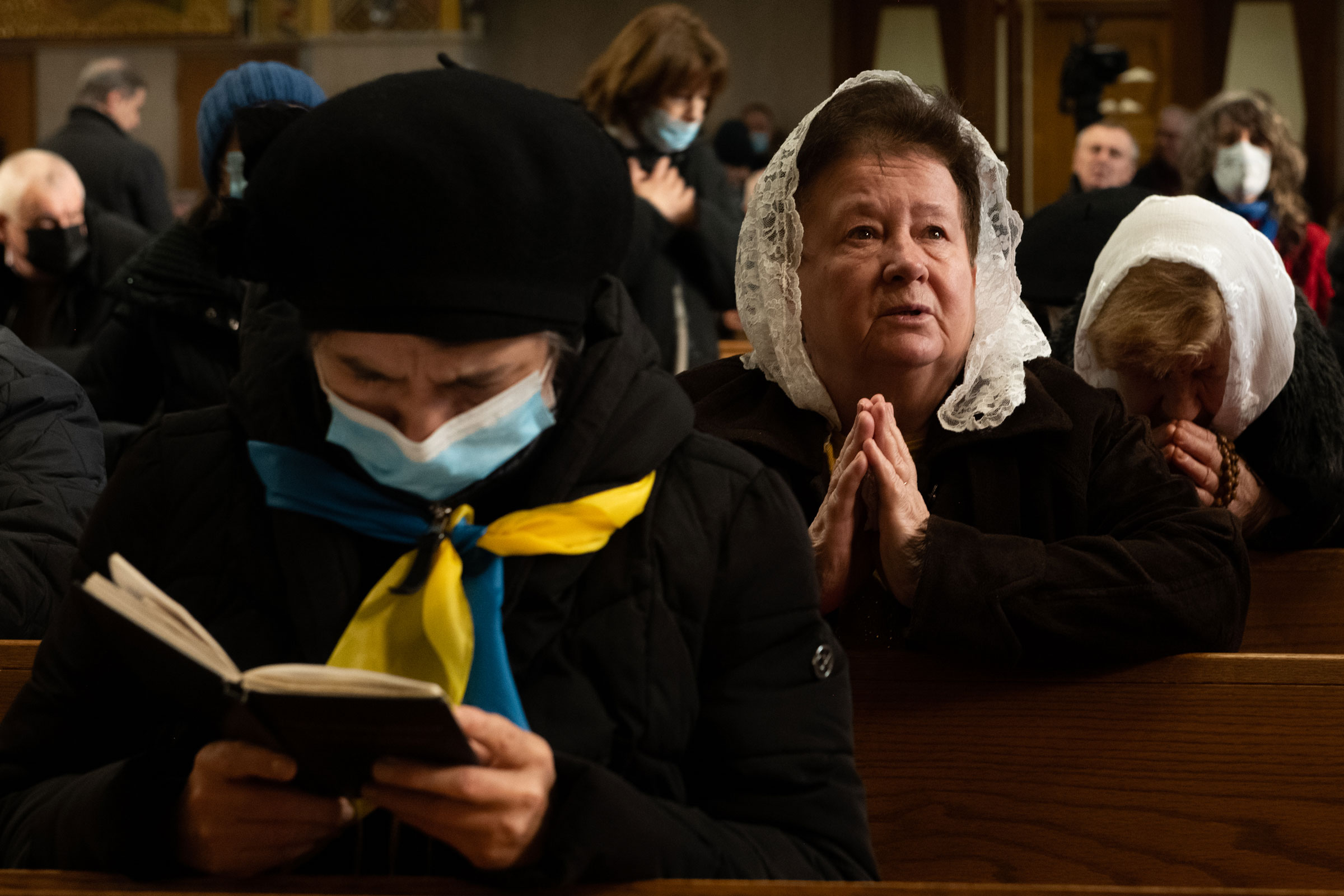
Vita Olevych, a Ukrainian American in Chicago, is in no mood to celebrate Easter on Sunday. “We don’t feel like we’re in the right headspace to celebrate anything,” Olevych says. “It’s been such a traumatizing and difficult couple of weeks.”
Normally, Olevych, 25, and her husband look forward to attending church for Easter service and preparing for the festival by cleaning their home and making Easter baskets. But this year their minds are focused fully on the Russian invasion of Ukraine, two family members who have sought refuge in their home, and their remaining family members in Chernivtsi. “Our days are consumed by checking the news and calling our family to make sure they’re OK,” Olevych says.
Easter is one of the most important holidays for Ukrainians around the world, many of whom are Orthodox Christians and typically celebrate Easter a week after Catholics and Protestants do. There are several dozen Ukrainian parishes for the religious branch across the U.S. Like other Christians, Orthodox Christians have 40 days of Lent, followed by Holy Week, which leads up to Easter—but members of the Ukrainian Orthodox church also take part in traditions unique to their culture. Most Ukrainian churches will use pussy willows instead of palms on Palm Sunday because it’s a reminder of what grows in Ukraine. And Ukrainians display uniquely designed Easter eggs known as pysanky.
This year, however, Easter is bringing up complicated feelings for many Ukrainians in the U.S. and in Ukraine. While some are looking to religion and the upcoming holiday for meaning, healing, and community, many say they are finding it difficult to feel the joy typically associated with Easter given the trauma caused by Russia’s invasion of Ukraine.
Olevych is exhausted. She spent the last month traveling and working to bring her cousin’s 26-year-old wife, Anastasiia Antoniak, and 5-year-old son, Bohdan, from Ukraine to her home in Chicago to escape the war. On March 4, Olevych flew to Romania, where her cousin had brought Antoniak and Bohdan, and where she twice failed to procure U.S. tourist visas for them. By March 30, she was accompanying them on a flight to Mexico, where they asked for humanitarian parole while driving across the U.S.-Mexico border. Antoniak’s husband, aunt, uncle, parents, and siblings still remain in Ukraine.
For some Ukrainian Americans, religion has provided a greater source of comfort. There’s a special spiritual significance for Easter this year, says Olena Lymar, who lives in Chicago and is on the parish board of St. Volodymyr Ukrainian Orthodox Cathedral. “We hope that the resurrection comes after the suffering and death of Christ, and it’s the same idea, that we hope for Ukraine to be resurrected as well,” says Lymar, 25. “We hope that after this terrible time, Ukraine will find light and peace—and that the Ukrainian people will be able to rebuild their country.”

Adrian Mazhur, a deacon with the Holy Trinity Cathedral in Manhattan, has also noticed more Ukrainians coming in for church service since the war began. He believes it’s likely because of the lack of control that people are feeling.
“When we look at our congregation, and look into their eyes, you can see the pain and sorrow that there’s not much they can do,” Mazhar says. “That’s the thing that kills us the most, because there’s so much that we can send, so much money that we can give, but at the end of the day, all they need is safety.” Mazhar is pressing on with community efforts regardless, focusing on gathering food, clothes, and toiletries to send to Ukrainian orphanages and refugee camps. Mazhar, who also works at a children’s hospital in New York, says the church school also decorated pysanky. The church later sold the eggs to raise a few thousand dollars to provide aid to Ukraine.
But even he finds it difficult to feel festive at this time. “In the back of our minds, it’s not going to be the same, because I cannot be happy and joyful when my family, my brothers and sisters, are dying and I’m wondering: when is the next bomb going to land?”
For Father Vasyl Dovgan, of the St. Nicholas Ukrainian Orthodox Church in Troy, N.Y., celebrating Easter this year means working directly with a colleague in Ukraine to help ensure soldiers on the frontline are equipped with what they need; Dovgan’s church has been sending money to a church in Lviv led by Father Mikola Kavchak to be used for gasoline to help with the delivery of essential supplies.
Kavchak has spent the last few weeks personally delivering food and clothes to hotspots across the country. Kavchak told TIME in a phone interview, translated by Dovgan, that many parents of soldiers have been coming to the church, praying for their kids.
Kavchak added that his church is planning to have Easter service on Sunday as they usually would. However, instead of holding the service in the middle of the night, they will hold it in the morning because the Ukrainian government says it is unsafe for people to be outside at that time.
Kavchak and other priests have been partaking in a Ukrainian tradition to bless a basket full of eggs, bread and meat. This weekend, they will travel to hotspots with the baskets to deliver them to soldiers as part of an effort to boost morale.
As Easter approaches, Antoniak is still getting settled in her Chicago home; she recently signed her son up for school in the city’s Ukrainian village neighborhood. But the stress of the last few weeks have taken a toll.
During a typical year, both she and Olevych said they would certainly attend Easter service at the church. This year, they’re not so sure. “Honestly, we don’t know,” Olevych says. “Lately everything has been in the spur of the moment so I think that’s how Sunday might be…It’s very hard to plan right now.”
More Must-Reads From TIME
- The 100 Most Influential People of 2024
- Coco Gauff Is Playing for Herself Now
- Scenes From Pro-Palestinian Encampments Across U.S. Universities
- 6 Compliments That Land Every Time
- If You're Dating Right Now , You're Brave: Column
- The AI That Could Heal a Divided Internet
- Fallout Is a Brilliant Model for the Future of Video Game Adaptations
- Want Weekly Recs on What to Watch, Read, and More? Sign Up for Worth Your Time
Write to Sanya Mansoor at sanya.mansoor@time.com